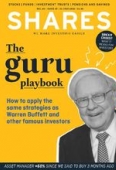Archived article
Please note that tax, investment, pension and ISA rules can change and the information and any views contained in this article may now be inaccurate.
How diversified do funds really need to be?

Investors backing a UK All Companies fund might think they are getting exposure to a spread of businesses across lots of different sectors, but they may need to check closely to make sure.
There are more than 250 funds in the UK All Companies sector, all tasked with finding UK-listed companies worth investing in. But the styles and approaches of these funds vary greatly. Many may not be what they first appear.
A number of funds concentrate their efforts on just one or two sectors, which could leave investors who don’t do their research over-exposed to particular industries.
CONCENTRATED ON A HANDFUL OF SECTORS
Lindsell Train UK Equity (GB00B18B9X76), for example, has more than 90% of its investments in just three sectors: consumer cyclicals, consumer defensives, and financial services. Meanwhile, the £5.4bn fund has no investments in the utilities, real estate, healthcare, industrial or communications industries.
Ardevora UK Equity (IE00B3WN9227) has almost 50% of its assets in just two sectors, and Unicorn UK Growth (GB0031217937) has 75% of its investments across three.
That these funds are so concentrated certainly doesn’t seem to have affected their performance. Unicorn UK Growth has returned 115.4% over the past five years – more than double the sector average of 56%.
The Lindsell Train fund has returned 96% and Ardevora 86%, making them both top-quartile performers in their peer groups over the period.
THE BENEFITS OF GENUINE ACTIVE MANAGEMENT
Tom Becket, chief investment officer at Psigma IM, says: ‘I’m a big believer in genuine active management and fund managers investing in areas where they have the greatest expertise. If you look at something like Lindsell Train, there is a genuine skill for stock-picking in certain sectors.’
Lindsell Train UK Equity has a bias towards consumer-branded goods, internet and media companies, financials and healthcare. Rather than this sector concentration adding risk to the fund, the team says the fact they only invest in ‘exceptional’ companies that have a low likelihood of disappointing means quite the opposite.
A Lindsell Train spokesman says: ‘For us, the definition of exceptional is a company that is likely to be profitably in business in 20 years’ time. Surprisingly few meet this test.
‘We are looking to identify durable businesses with high dividend-paying potential and our many years of investing leads us to find such businesses predominantly in these industry categories.’
Peter Michaelis manages the Liontrust UK Ethical (GB00B84BWN15) fund, which has 50% of its assets in two sectors: consumer cyclical and financial services stocks. The fund has zero exposure to four sectors and less than 3% of its money in a further two.
Sector concentration is, perhaps, more inevitable in an ethical fund. As part of its screening process it immediately rules out companies involved in oil and gas, tobacco, arms and animal testing. That means no energy or healthcare investments and very few in the consumer staples sector.
STRONG CONVICTION
Michaelis says: ‘We invest in companies that are more sustainable and linked to long-term positive trends such as energy efficiency and digital security. If investors want exposure to the entire index they should just buy a passive fund.
‘Active funds should be actively managed. You are paying for manager’s skill in choosing the best companies where they have strong conviction.’
Richard Curling, manager of the Jupiter UK Alpha (GB00B457WC97) fund, also points out that focusing purely on sectors may be misleading.
His fund, for example, has around a quarter of its assets in financial firms but these include banks, insurers and a litigation company. He says: ‘These all come under the banner of financials but they’re quite different businesses, so we may look more concentrated than we really are.’
His fund takes the best ideas from the various other UK funds at Jupiter, but there is a cap on how far overweight it can go on sector exposure compared to the index in case managers have ideas within the same industries.
Becket adds: ‘While managers should do what they do best, I also believe in diversification. You shouldn’t put all of your eggs in one basket, especially if the fund manager has already put all of his eggs in just one or two baskets.’
THE BENEFITS OF CAREFUL RESEARCH
He says investors should be sure to do their research when picking funds to ensure they are not over- or under-exposed to any particular sectors. If all of your funds have a bias towards financial firms, for example, and there’s another financial crisis, the value of your investments could all fall at once.
Investors can find out where their money is invested by checking a fund’s fact sheet, which will typically show a breakdown of the sectors where the manager has put his money.
For those who are concerned about being over-exposed, using a so-called ‘core and satellite’ approach to investing may be a good choice. This mean picking a wider-reaching, diversified fund as your main holding and then picking out some specialist investments, which focus on a particular area such as healthcare or technology, or where the manager has a specific style.
Curling adds: ‘Managers need to be very clear about what their biases and style are and what risks that exposes them to. Investors might think they are getting generalist all-round exposure to the market and sometimes that is not the case.’ (HB)
Important information:
These articles are provided by Shares magazine which is published by AJ Bell Media, a part of AJ Bell. Shares is not written by AJ Bell.
Shares is provided for your general information and use and is not a personal recommendation to invest. It is not intended to be relied upon by you in making or not making any investment decisions. The investments referred to in these articles will not be suitable for all investors. If in doubt please seek appropriate independent financial advice.
Investors acting on the information in these articles do so at their own risk and AJ Bell Media and its staff do not accept liability for losses suffered by investors as a result of their investment decisions.
Issue contents
Big News
- Stocks super charged by electric vehicle plans
- TalkTalk buyout rumours emerge as chairman ups stake close to 30%
- What the latest Brexit news means for markets and investors
- Echostar walks away but Inmarsat still in play, say analysts
- Sunny weather and England’s top World Cup performance hits holiday bookings

 magazine
magazine









